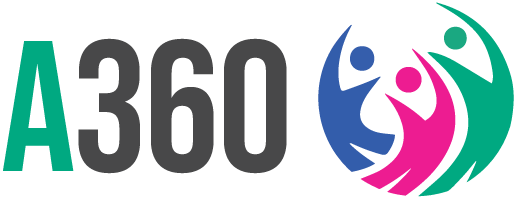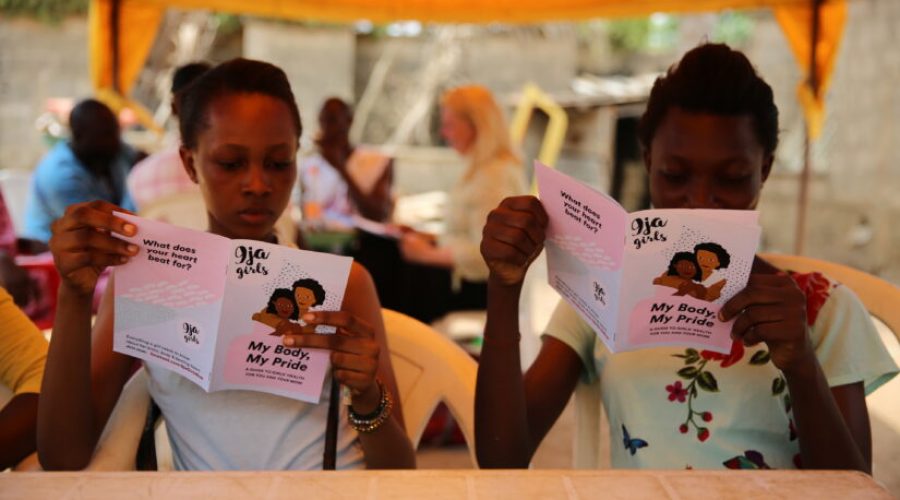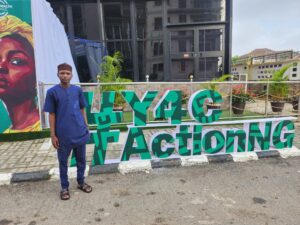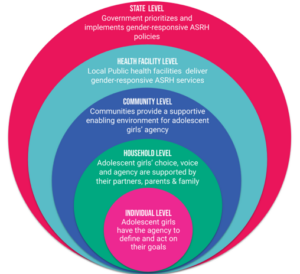By Kasey Henderson, Senior Associate Communications Manager, PSI
When she was in secondary school, three of Seun Taylor’s school friends had an unsafe abortion. Two of the three died from complications related to the procedure.
None of Seun’s classmates had received the correct information about their sexual and reproductive health options and like Seun, these girls didn’t have access to contraception.
One in four Nigerian girls aged 15-19 want but don’t have access to modern contraception; one in five girls will have given birth by age 19. And among this age group, one in four pregnancies will end in abortion, many of which are unsafe.
This is the norm, but as Seun explained, it doesn’t make it any less terrifying to witness.
Girls in Nigeria often face deep societal and cultural challenges in accessing contraception. Seun’s classmates, like so many girls across Nigeria, didn’t have the tools or information to make healthy decisions for their bodies, their lives – and their futures. They lacked access to contraception, and perhaps more importantly lacked the knowledge of what contraception options were available to them.
Seun knew things needed to change.
Deeply empathetic by nature, Seun felt that she wanted to be a part of something that could change the course of the future for girls in her school and across her nation. As she moved from secondary school to university, she kept coming back to the same thought.
“If only these girls had taken contraception, they might still be alive,” Seun said.[/vc_column_text][vc_single_image image=”5905″ img_size=”full” add_caption=”yes” alignment=”center”][vc_column_text]After graduating from university, she began a year of Youth Service, working on a family planning project in Southern Nigeria. As part of her work, Seun attended a training in her office hosted by Society for Family Health (SFH), implementing PSI’s Adolescents 360 (A360), a youth-powered sexual and reproductive health (SRH) project that works with and for young people to transform how girls like herself access the tools they need to make healthy and safe decisions for their bodies and their lives. Access to contraception is a key part of that work.
“I came away from that session thinking, ‘wow, this is beautiful’,” Seun recalled. “Girls are dying [without contraception]. When I learned about [A360], I knew I had to be a part of it.”
When she saw an advertisement for a position as a young designer with A360, Seun immediately applied.
Seun landed the job. While she was ecstatic to begin working in a role she was incredibly passionate about, she remembers the hesitation she felt about working with young girls who were having sex. After all, in Nigeria, sex before marriage remains taboo.
“When I first began, I saw how young the girls were. I thought that my conscience might not let me do this,” Seun details. “Then I got to the communities and I realized that these young girls need [support to make healthy, informed decisions].”
Seun knew that access to contraception could change lives. She dove headfirst into her new position to learn everything she could to excel at her job and help the girls in her community.[/vc_column_text][/vc_column][/vc_row][vc_row][vc_column][vc_text_separator title=”And then, COVID-19 shook the world.”][vc_column_text]Between lockdowns and the overwhelming fear of virus transmission, girls throughout Nigeria were now facing additional barriers as they attempted to access SRH services.
Not one to shy away from a challenge, Seun only became more determined to be the best she can be as an advocate for girls and a young designer trying to understand the evolving needs of the community.
Seun and the rest of the A360 team began focusing on digital solutions, partnering with Facebook to continue reaching young girls with the sexual health information that she and her classmates lacked all those years ago. Through chatbots, local provider WhatsApp groups and e-retail services offering free SRH product delivery, the A360 team tested different online solutions to ensure that girls could be reached where and how they felt most comfortable.
For Seun, this is all about igniting change that sticks – during and beyond the pandemic.
“I’m all about impact and if COVID-19 has taught us anything, it’s that nothing is impossible. That’s the way I want to view the world – through the impact I can make,” Seun says.
Interested in learning more about 9ja Girls? Keep exploring by clicking here, or the additional stories below.




